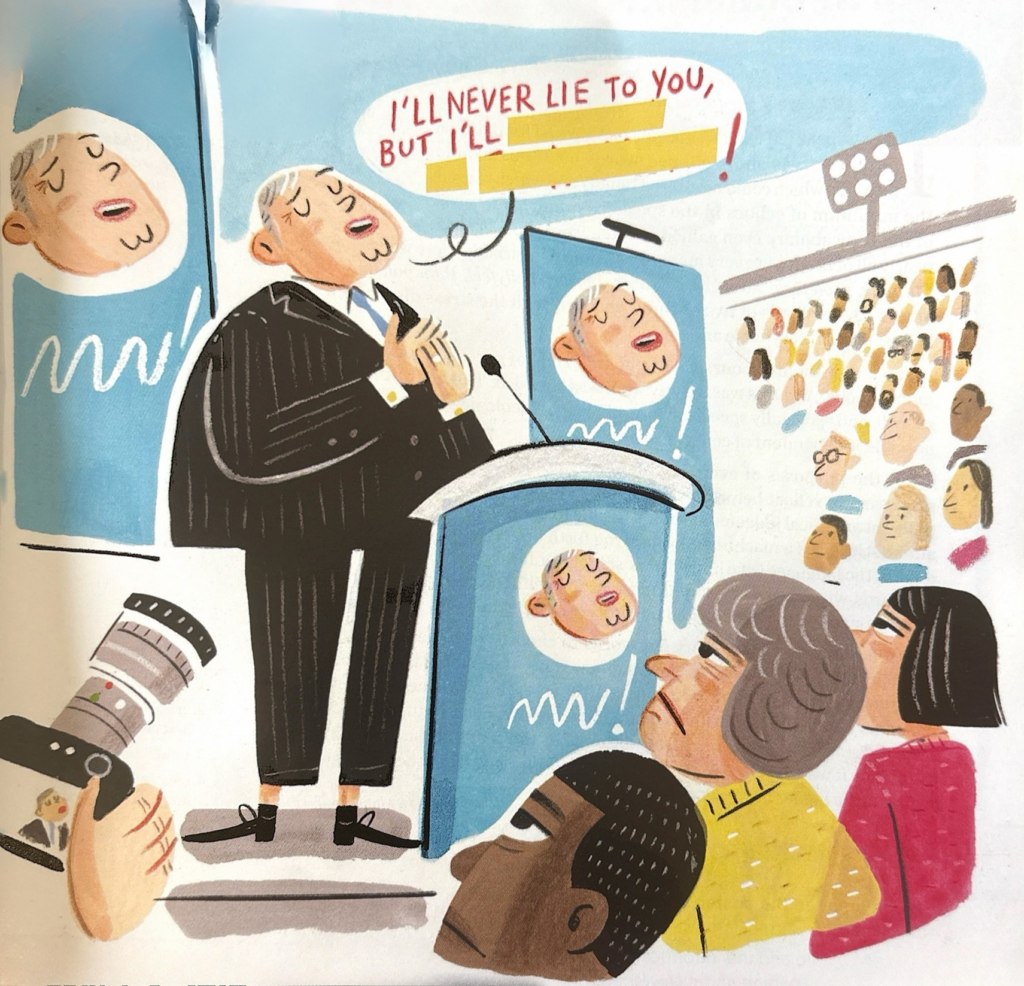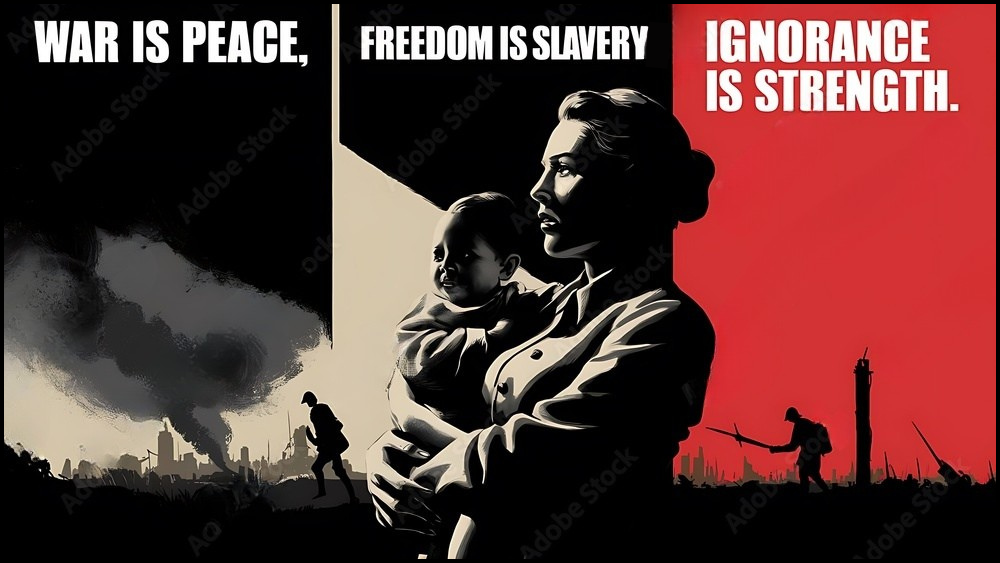
The power of words
- Thème : How can words manipulate and control?
- Observation d’une illustration : identifier le lieu, les personnages et interpréter la scène
- Analyse du discours : repérer les signes de manipulation dans les mots de l’orateur
- Exercice interactif : compléter la phrase “I’ll never lie to you, but I’ll…” à partir d’idées proposées
- Expression orale : proposer et expliquer sa propre fin de phrase en justifiant le choix
- Réflexion collective : comment les mots peuvent-ils influencer, persuader ou tromper ?
1. Look at the illustration. Explain the situation: the place, the people.
What makes you think this?
1. Regarde l’illustration. Explique la situation : le lieu, les personnes.
Qu’est-ce qui te fait penser cela ?
-
the place
The scene takes place in a political rally or public speech. There is a podium, cameras, and a large audience, suggesting a formal event.
La scène se déroule lors d’un meeting politique ou discours public. On voit un pupitre, des caméras et une foule nombreuse, ce qui évoque un événement officiel.
-
the people
The man speaking is likely a politician giving a speech. The audience seems attentive but skeptical, with serious or doubtful expressions. A camera operator is also filming the event.
L’homme qui parle est probablement un politicien prononçant un discours. Le public paraît attentif mais sceptique, avec des expressions sérieuses ou méfiantes. Un caméraman filme également la scène.
-
interpretation
The sentence “I’ll never lie to you, but I’ll…” hints at manipulative language. It suggests that the speaker may be hiding something or twisting the truth.
La phrase « Je ne vous mentirai jamais, mais je vais… » laisse entendre une manipulation par les mots. Elle suggère que l’orateur pourrait cacher la vérité ou la détourner.

2. Judging from the audience’s reactions, what do you think the speaker’s message is? Finish his sentence!
2. En te basant sur les réactions du public, que penses-tu du message de l’orateur ? Termine sa phrase !
Interactive Helper — Finish the sentence
Start from the prompt and build an ending by clicking the idea chips. Pars de l’amorce et complète la fin en cliquant sur les idées.
Amorce : « Je ne vous mentirai jamais, mais je vais… »
Hint: audience reactions
Faces look doubtful → choose endings that sound evasive or manipulative rather than fully honest.
Le public semble sceptique → choisis des fins qui paraissent évasives ou manipulatrices plutôt que totalement franches.
Useful language
- to spin the story = enjoliver / orienter le récit
- to cherry-pick = sélectionner seulement ce qui arrange
- to omit = omettre
- clever wording = formulation habile
Sample endings
“I’ll never lie to you, but I’ll cherry-pick the facts to keep you hopeful.”
“I’ll never lie to you, but I’ll simplify the truth and skip the bad parts.”
“I’ll never lie to you, but I’ll reframe the facts so they sound better.”
« Je ne vous mentirai jamais, mais je vais sélectionner les faits qui vous rassurent. »
« … simplifier la vérité et passer les mauvaises nouvelles. »
« … reformuler les faits pour qu’ils paraissent meilleurs. »

War is peace
- Activity: More information
Vocabulary Kit — Newspeak & Propaganda
- = totalitaire
- = propagande
- = Novlangue
- = mots tronqués / abrégés
- = sans équivoque
- = éveiller / susciter (des échos)
- = lexique / vocabulaire
- = baragouinage / débit précipité
- = saccadé
- = monotone
- = idéologiquement neutre
- = conscience
- = jugement éthique
- = déverser / mitrailler (des opinions)
- = infaillible
- = délibérée (laideur)
- = en accord avec / conforme à
- = conçu / imaginé
- = réduction / diminution
- = articulé / clairement exprimé
1. Comment on the poster. What type of fiction do you associate with it?
1. Commente l’affiche. À quel type de fiction l’associes-tu ?
-
visual clues
The poster mixes war imagery and propaganda slogans. The contrast between the peaceful mother and the chaos behind her creates tension.
L’affiche mêle des images de guerre et des slogans de propagande. Le contraste entre la mère sereine et le chaos en arrière-plan crée une tension.
-
slogans
The slogans — “War is peace”, “Freedom is slavery”, “Ignorance is strength” — are contradictory. They show how language can be used to manipulate truth and control thought.
Les slogans — « La guerre, c’est la paix », « La liberté, c’est l’esclavage », « L’ignorance, c’est la force » — sont contradictoires. Ils montrent comment le langage peut manipuler la vérité et contrôler la pensée.
-
type of fiction
This poster clearly belongs to the world of dystopian fiction, especially works like George Orwell’s 1984. It represents a totalitarian regime that controls citizens through language and propaganda.
Cette affiche appartient clairement au genre de la fiction dystopique, en particulier à l’univers du 1984 de George Orwell. Elle représente un régime totalitaire qui contrôle ses citoyens par le langage et la propagande.
-
interpretation
The message warns us about manipulative governments and how words can shape people’s beliefs. The repetition of contradictions forces citizens to accept lies as truth.
Le message met en garde contre les gouvernements manipulateurs et la manière dont les mots peuvent façonner les croyances. La répétition de contradictions pousse les citoyens à accepter le mensonge comme vérité.

Take the document A machine-gun spraying forth bullets….
b. Read the title and the introduction. What can you imagine about Newspeak?
b. Lis le titre et l’introduction. Que peux-tu imaginer à propos de la Novlangue ?
-
purpose
Newspeak was created by the government to control people’s thoughts and limit freedom of expression.
La Novlangue a été créée par le gouvernement pour contrôler la pensée des gens et limiter leur liberté d’expression.
-
form
It is a simplified version of English with fewer words, making it hard to express complex or rebellious ideas.
C’est une version simplifiée de l’anglais avec moins de mots, ce qui rend difficile l’expression d’idées complexes ou de révolte.
-
impact
By reducing vocabulary, the regime makes critical thinking impossible. People can only say what the Party allows.
En réduisant le vocabulaire, le régime rend la pensée critique impossible. Les gens ne peuvent dire que ce que le Parti autorise.
-
message
Newspeak shows how language can be a tool of manipulation and control.
La Novlangue montre comment le langage peut devenir un outil de manipulation et de contrôle.
“A machine-gun spraying forth bullets…” — George Orwell
In the totalitarian state of Oceania, governed by Big Brother, a language called Newspeak has been created as a way of spreading the regime’s political propaganda.
In Newspeak […] what was required, above all for political purposes, was short clipped words of unmistakable meaning which could be uttered rapidly and which roused the minimum of echoes in the speaker’s mind. The words of the B vocabulary even gained in force from the fact that nearly all of them were very much alike. Almost invariably these words — goodthink, Minipax, prolefeed, sexcrime, joycamp, Ingsoc, bellyfeel, thinkpol, and countless others — were words of two or three syllables, with the stress distributed equally between the first syllable and the last.
The use of them encouraged a gabbling style of speech, at once staccato and monotonous. And this was exactly what was aimed at. The intention was to make speech, and especially speech on any subject not ideologically neutral, as nearly as possible independent of consciousness.
For the purposes of everyday life it was no doubt necessary, or sometimes necessary, to reflect before speaking, but a Party member called upon to make a political or ethical judgement should be able to spray forth the correct opinions as automatically as a machine-gun spraying forth bullets. His training fitted him to do this, the language gave him an almost foolproof instrument, and the texture of the words, with their harsh sound and a certain wilful ugliness which was in accord with the spirit of Ingsoc, assisted the process still further.
So did the fact of having very few words to choose from. Relative to our own, the Newspeak vocabulary was tiny, and new ways of reducing it were constantly being devised. Newspeak, indeed, differed from most all other languages in that its vocabulary grew smaller instead of larger every year. Each reduction was a gain, since the smaller the area of choice, the smaller the temptation to take thought.
Ultimately it was hoped to make articulate speech issue from the larynx without involving the higher brain centres at all.
— Nineteen Eighty-Four (1949)
2a. Read the text. Pick out references to the characteristics of Newspeak: sound and vocabulary.
2a. Lis le texte. Relève les références aux caractéristiques de la Novlangue : le son et le vocabulaire.
-
sound
The language is staccato and monotonous, with short, harsh-sounding words that create a mechanical, emotionless rhythm.
La langue est saccadée et monotone, avec des mots courts et durs qui produisent un rythme mécanique et sans émotion.
-
vocabulary
The Newspeak vocabulary is tiny and constantly reduced; each year words are removed to narrow the range of thought and eliminate complex ideas.
Le vocabulaire de la Novlangue est minuscule et sans cesse réduit ; chaque année, des mots sont supprimés pour réduire le champ de la pensée et supprimer les idées complexes.
-
structure
Words are short, clipped, and similar in form, such as “goodthink” or “bellyfeel,” which make speech quick and thoughtless.
Les mots sont courts, abrégés et similaires, comme « goodthink » ou « bellyfeel », ce qui rend la parole rapide et sans réflexion.
-
effect
The reduction of words aims to make people incapable of critical thinking and ensure that speech is automatic and controlled by ideology.
La réduction du vocabulaire vise à rendre les gens incapables de penser de manière critique et à faire en sorte que la parole soit automatique et idéologiquement contrôlée.
b. How does it serve the regime’s purpose?
b. En quoi la Novlangue sert-elle les objectifs du régime ?
-
control of thought
By reducing language, the regime limits the ability to think critically or imagine rebellion. People can only express ideas approved by the Party.
En réduisant la langue, le régime limite la capacité de penser de manière critique ou d’imaginer une rébellion. Les gens ne peuvent exprimer que les idées approuvées par le Parti.
-
propaganda
Newspeak makes propaganda easier by shaping speech so that all sentences automatically support the government’s ideology.
La Novlangue facilite la propagande en façonnant le langage pour que toutes les phrases soutiennent automatiquement l’idéologie du gouvernement.
-
obedience
Without words for freedom or opposition, citizens cannot even conceive of disobedience — they become perfectly obedient.
Sans mots pour parler de liberté ou d’opposition, les citoyens ne peuvent même pas concevoir la désobéissance — ils deviennent parfaitement obéissants.
-
mental control
The regime’s goal is to make speech automatic and emotionless, turning people into tools of the Party’s will.
Le but du régime est de rendre la parole automatique et sans émotion, transformant les individus en instruments de la volonté du Parti.